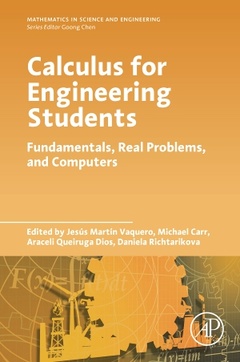Calculus for Engineering Students Fundamentals, Real Problems, and Computers Mathematics in Science and Engineering Series
Coordonnateurs : Vaquero Jesus Martin, Carr Michael, Quieruga-Dios Araceli, Richtarikova Daniela

Calculus for Engineering Students: Fundamentals, Real Problems, and Computers insists that mathematics cannot be separated from chemistry, mechanics, electricity, electronics, automation, and other disciplines. It emphasizes interdisciplinary problems as a way to show the importance of calculus in engineering tasks and problems. While concentrating on actual problems instead of theory, the book uses Computer Algebra Systems (CAS) to help students incorporate lessons into their own studies. Assuming a working familiarity with calculus concepts, the book provides a hands-on opportunity for students to increase their calculus and mathematics skills while also learning about engineering applications.
2. Differentiation (one and multiple variables)
3. Complex numbers and functions
4. Real and complex sequences and series
5. Function series (including Taylor and Fourier series)
6. Applications of integrals (one variable)
7. Double and multiple integrals
8. Nonlinear equations (and systems of nonlinear equations)
9. Linear optimization and the simplex method
10. Nonlinear optimization
11. First-order and systems of first-order differential equations
12. Higher-order and systems of higher-order ordinary differential equations
13. Partial differential equations
14. Laplace and z transforms
Upper-division undergraduates and graduate engineering students who need to learn more mathematics, especially through engineering-oriented applications
Micahel Carr has worked in the development of core mathematical skills, mathematics education for engineers, and mathematical education in Irish prisons. He has published innthe European Journal of Engineering, the Proceedings of the 45th SEFI Annual Conference, and the 41st SEFI conference.
Araceli Queiruga Dios is a lecturer in Mathematics at the Department of Applied Mathematics at the School of Industrial Engineering in Béjar, Spain. She studies public key cryptography as well as educational tools and mathematical applications for engineering students. She has published in the International Journal of Computer Mathematics and in the Lecture Notes in Computer Science (bioinformatics and artificial intelligence).
Daniela Richtáriková has teached mathematics and related subjects at Slovak University of Technology in Bratislava since 1992. She finished her studies at Comenius University, and received her PhD at Slovak University of Technology. Her main research interests include fractal geometry, elements of chaos theory, and relationships between mathematics and art. Nowadays, she focuses on applied mathematics and pedagogical research in the field of active and competency based mathematical education. She is the author of more than 80 papers and two textbooks. She acts as an executive secretary in the Slovak Society for Geometry and Graphics, the editor of
- Organized around project-based rather than traditional homework-based learning
- Reviews basic mathematics and theory while also introducing applications
- Employs uniform chapter sections that encourage the comparison and contrast of different areas of engineering
Date de parution : 08-2020
Ouvrage de 370 p.
15x22.8 cm
Thèmes de Calculus for Engineering Students :
Mots-clés :
applications in real problems; applications to real problems; arc parameter; area and volume; Bessel equation; buckling; Compound interest; critical forces; derivative; differential equations; engineering applications; Euler equation; Function; heat transfer; higher-order differential equations; Infinitesimals; integrals; Koch snowflake; Limit; linear and nonlinear differential equations; mathematica; MATLAB; mechanical engineering applications; networks; Newton"s method; nonlinear equations; optimality principles; optimization; oscillations; polar and spherical coordinates; probability distribution; programs; shortest path; solution of partial differential equations; solutions of differential equations; submarine cables; systems of differential equations; systems of nonlinear equations; trajectory collision; transfer function; wave equation



